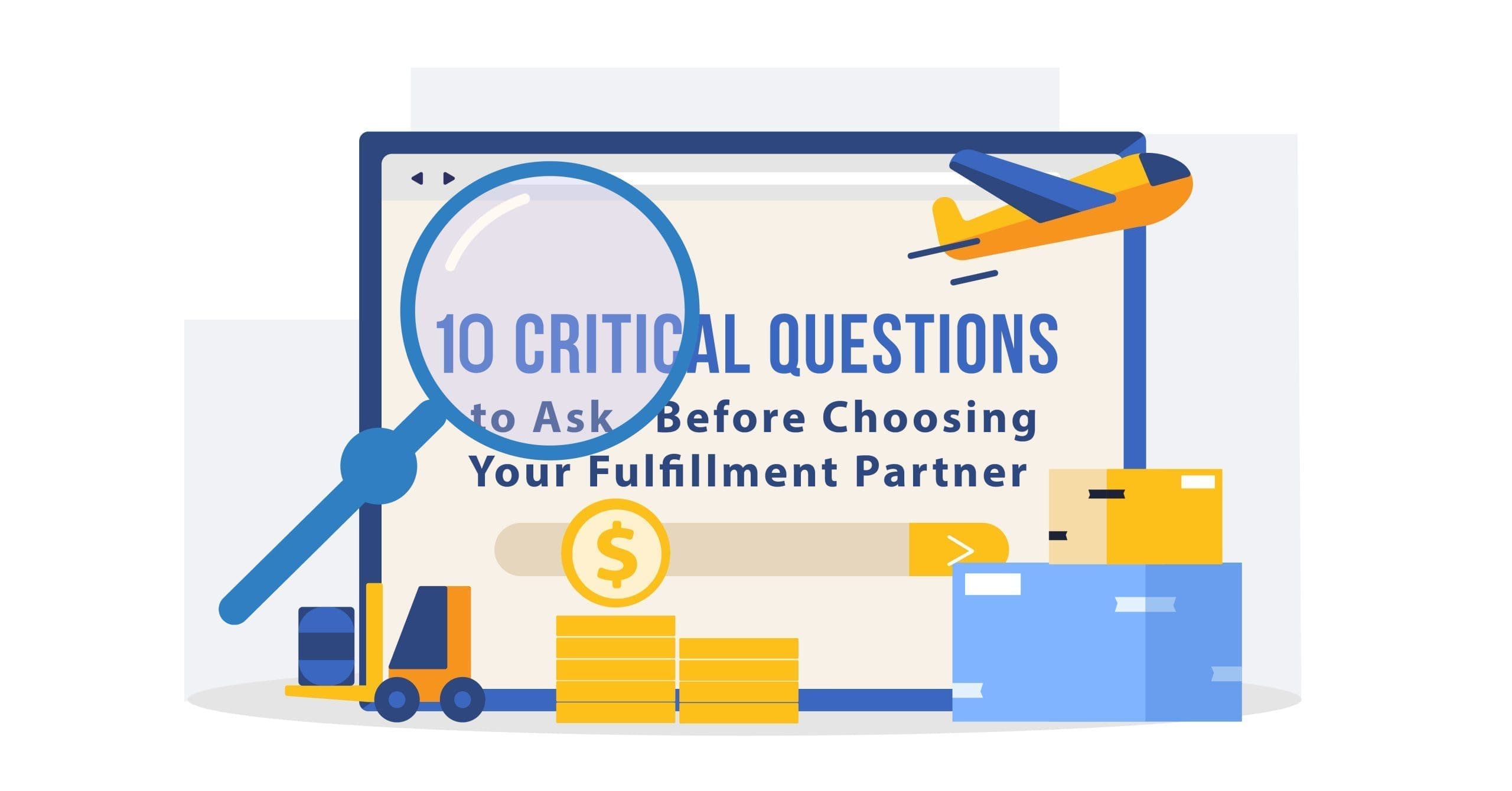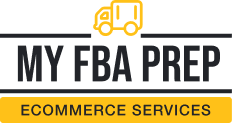
10 Critical Questions to Ask Before Choosing Your Fulfillment Partner

Fulfillment is an important consideration for buyers. They judge companies based on the speed, cost, efficiency, and trustworthiness of their shipping and return options — and they have high expectations. So much so that over 90% of shoppers expect their items in less than a week. Moreover, 53% of shoppers have canceled an order when they found shipping to be too slow, and 54% due to expensive fulfillment.
Needless to say, your fulfillment process is a huge deal and will play a critical role in your brand’s long-term results.
So, how do you get started on your search the right way?
Today we’ll shine the floodlight on the best questions to ask when looking for fulfillment services to ensure you find the right fit.
The real reasons why brands struggle to find their fulfillment match
Picking the right fulfillment partner is a long process, but there are some common mistakes businesses make that can prolong and increase your costs.
Rushing the process
It can be tempting to sign up for the first deal you see with little research to back up your decision. But “slow and steady wins the race” when searching for fulfillment services. Ideally, the fulfillment partner you choose will be with you for the long haul, so you should take your time.
It’s a worthwhile investment to assess your options diligently before committing. Set aside time in your schedule to give the search your full attention and thoroughly evaluate your options.
Not knowing what to look for
No matter how many years they’ve operated or awards they’ve won, no fulfillment service is perfect and offers everything.
Every business is unique, which means the services and turnaround times you need from your fulfillment partner will be unique as well.
It’s vital you know what the green and red flags are when searching for a partner. This approach will up your odds of finding your ideal match. Consider your budget, products, trading territories, services required, and the desired fulfillment experience before searching.
Tip: While it’s important to find a service that provides good value for money, if a deal sounds like it’s too good to be true, it probably is.
Having unrealistic expectations
It’s critical to enter the search with a clear understanding of what services are reasonable to ask for from a fulfillment provider.
For example, if you value ownership, you can ask for more insight into the warehouse processes. A fulfillment partner should be happy to take you on a warehouse tour to see how your inventory will be handled, and most should have a warehouse management system that provides real-time visibility into where your inventory is at all times.
However, you cannot hire your own warehouse manager and expect a 3PL to put them in charge of their entire warehouse.
10 Questions to ask before you select a fulfillment partner
1. What processes do we need to outsource?
Assess your fulfillment obligations, including prep and pack, warehousing, and shipping. Remember to add the tasks that aren’t mission-critical but either take up too much of your team’s time or are simply tedious and unenjoyable.
Action points:
- List the fulfillment tasks you need.
- Consider tasks you may want to outsource in the future.
- Assess the fulfillment options your competitors offer to gain an idea of what you’re up against.
2. What are our fulfillment needs?
Even if a company sells identical products, its fulfillment needs can differ greatly depending on things like internal processes, capacity, and budget.
Be specific about what characteristics and assets you want in a fulfillment service. You could look at:
- Experience
- Pricing
- Transparency in processes
- Setup offered (e.g., flexible or fixed logistics)
- Order volume capacity
- Storage capacity
- A variety of services offered
Take note of any storage, packing, and transportation requirements. Also, acknowledge your current customer shipping expectations (e.g., two-day shipping and free, paperless returns). If you aim to target new markets, research shipping options and expectations in those regions.
Action points:
- Understand your customers’ shipping wants and needs.
- Pinpoint essential characteristics your fulfillment provider must accommodate.
- Research your target customer’s shipping expectations in territories where you aim to sell.
- Ask if the provider can inventory-related initiatives like back orders, presales, and subscriptions.
3. What’s our budget?
To receive realistic quotes, it’s vital you establish a healthy budget that reflects the fulfillment services you need. If you have a small budget, it’s okay to start small. It may mean outsourcing only a few tasks until you have more capital to work with and add as you go.
It’s important to know upfront the costs of fulfillment services and materials like dunnage, shipping boxes, and custom packaging for your order volume and shipping requirements. The offer should then go into a service-level agreement (SLA).
Action points:
- Shop around to gain an idea of the typical starting price for the services you need and the type of fulfillment provider you want to work with.
- Create a shortlist of potential providers based on who can provide the best value for the money.
- Gather quotes from your shortlisted fulfillment service providers.
4. What information do we need from the fulfillment providers to make an informed decision?
While you can uncover certain things on your own, like reviews and testimonials, you’ll need to request other information directly from the fulfillment provider (although some details may be proprietary).
This can include performance data (e.g., on-time shipment rate, error rate, and inventory damage), closed case studies from businesses in your niche, insurance documents, and samples of standard operating procedures they use for items like yours.
Action points:
- Know what data you need, using your internal processes, executive team’s requests, and past experiences as a guide.
- Request the information you need from Sales, Customer Support, or Management.
5. What tech integrations do we need?
From CRMs and inventory management software to sales and social media channels, every business has the essential tech tools they need to operate. Before you sign on the dotted line, learn whether the fulfillment provider can accommodate your preferred stack.
Action points:
- List the software you wish to integrate.
- Inquire whether the fulfillment provider accepts these tools for integration.
- Ask how much data you can export from existing tools.
- Understand the downtime involved in integrations.
- Ask whether it’s possible to integrate tools not on their current integrations list, how much it’ll cost to execute, and how long it’ll take.
6. What shipping services are must-haves?
Efficient and affordable transportation of goods from manufacturers to warehouses and then to customers is critical. So, enquire about the provider’s logistical capabilities to ensure they match your needs.
For example, if you sell in multiple territories, ask if they have access to a freight network and contracts with various reputable carriers to act as first-, second-, and third-line options.
Action points:
- Understand your average inventory turnover rates.
- Know the average time it takes to ship goods using your chosen transportation method (e.g., by rail and road).
- Ask the fulfillment service about the shipping types they offer and their costs.
7. Is the fulfillment provider tech-driven?
From AI product sorting to live inventory tracking, digital transformation is sweeping the fulfillment industry. A company that’s serious about driving efficiency, speed, and productivity for its customers should be invested in technology. This could be analytics to track inventory levels, bots to handle boxing, and more. Continuous improvement should be an ongoing priority of theirs.
Action points:
- Find out what tech stack the fulfillment service uses.
- Enquire which services are executed manually and why.
- Ask about pending technological improvements and when they’ll go into effect.
8. What security measures are in place to protect our inventory?
Counterfeiting, theft, tampering, and tech malfunctions pose huge risks to your business. Your fulfillment provider must have robust security systems to keep your inventory safe, no matter where it is in their ecosystem.
Action points:
- Ask whether the fulfillment provider has 24/7 security and if so, how robust it is (e.g. how many guards oversee the facility and do they have quality video surveillance and alarm systems).
- Find out if they have temperature and fire control systems in place.
- Investigate how many security issues they’ve had in the past year and how they resolved them.
9. What are the service level agreements you must adhere to?
Each sales channel has its own service level agreements (SLAs). This helps to protect the buyer experience by ensuring items are delivered on time, accurately, and reliably.
You want to find a good logistics partner that matches where your supply comes from and where your consumers live.
For example, if you’re based in Florida but your shipments come into California, look for a partner that has a California warehouse so you don’t have to truck items all the way across the country before you start prep. Likewise, if many of your customers live on the East Coast, you’ll want a partner that can store inventory nearby for fast deliveries.
Action points:
- Ask about a fulfillment provider’s service level agreements when it comes to turnaround time and delivery reliability.
- Find out what holidays they take that might interrupt regular delivery hours.
- Enquire about their delivery rates for other merchants and how they meet SLAs on different sales channels.
- Learn if there’s a communication channel in place for emergency support.
10. Can a provider support international expansion?
As brands look to scale and expand their businesses, cross-border selling is quickly becoming a must.
Many brands are eager to reduce risk through territorial diversification, accelerate sales, and increase brand notoriety. So, look for a provider that can help you execute cross-border strategies affordably and efficiently.
For example, at MyFBAPrep, we have a warehouse network of over 50 warehouses and partnerships with some of the world’s most trusted freight and logistics companies like SEKO.
Action points:
- Ask what cross-border services the fulfillment provider offers.
- Find out how much it costs to ship goods to the countries you receive the most orders from.
- Determine pricing and timelines for shipping by region and item size/height.
The right partner is worth the effort
Finding a fulfillment partner that’s the right fit for your brand can be a research-intensive process that requires significant time and resources. But when you’re armed with precise information, you can sidestep mistakes to identify your ideal match faster.
Create a partnership framework with our questions, approach potential providers, and set up tests to verify assumptions or dispel any concerns. With a reliable fulfillment provider, you’ll have optimized shipping solutions at your disposal, and your customers, staff, and bank account will thank you for it.


